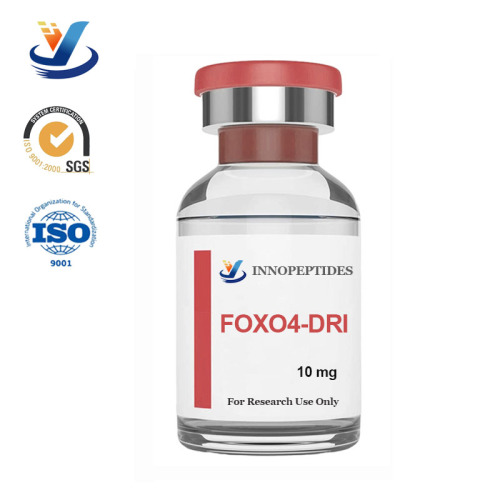In today's beauty industry, consumers are becoming increasingly conscious of their environmental impact. As the demand for natural, sustainable, and eco-friendly products grows, cosmetic peptides have emerged as a powerful solution in the world of skincare. Cosmetic peptides, known for their anti-aging and rejuvenating properties, are now being produced with an emphasis on environmental responsibility. In this article, we explore how cosmetic peptides are transforming the beauty industry, focusing on key aspects like sustainable sourcing, eco-friendly production processes, biodegradable ingredients, and more. As a cosmetic peptides manufacturer, it's crucial to understand these trends and ensure your products align with consumer expectations for sustainability.
Table of contents
Sustainable Sourcing of Cosmetic Peptides
Eco-Friendly Production Processes
Biodegradable Ingredients and Eco-Conscious Formulations
Ethical Production Practices and Certifications
Eco-Conscious Packaging and Waste Reduction
Sustainable Sourcing of Cosmetic Peptides
The first and most critical aspect of eco-friendly cosmetic peptides is the sourcing of raw materials. Consumers are increasingly demanding transparency in where and how the ingredients are sourced. When it comes to peptides, which are often synthesized in laboratories, the environmental impact of their raw materials is just as important as the final product.
For a cosmetic peptides manufacturer, ensuring that peptides are derived from sustainable, non-toxic sources is essential. This may involve using plant-based or bio-sourced materials that are renewable and have minimal environmental impact. Some manufacturers are even exploring biotechnological methods to produce peptides, reducing reliance on traditional animal-derived sources or non-renewable resources. When marketed as eco-friendly, these products not only meet ethical standards but also appeal to a growing base of environmentally-conscious consumers who want to make responsible purchasing decisions.

Eco-Friendly Production Processes
Once cosmetic peptides are sourced, the next step is their production. Traditional manufacturing processes in the beauty industry often involve harmful chemicals, excessive energy consumption, and waste generation. However, the shift towards eco-friendly production methods is gaining momentum, with many cosmetic peptides manufacturers opting for greener alternatives.
Incorporating green chemistry principles can drastically lower the environmental footprint of peptide-based products. Many manufacturers are also investing in renewable energy sources for their production facilities to further reduce their carbon footprint.
Biodegradable Ingredients and Eco-Conscious Formulations
One of the most critical factors for consumers when selecting beauty products today is their environmental impact after use. Are the ingredients biodegradable? Do they break down harmlessly in nature, or do they pose a risk to ecosystems? For cosmetic peptides, the goal is to ensure that all ingredients used in formulations are biodegradable and free from harmful residues that could damage the environment.
Peptides themselves, as naturally occurring biological molecules, tend to be more biodegradable than synthetic chemicals. However, it is still crucial to ensure that other ingredients in the product are also biodegradable and eco-friendly. Many cosmetic peptides manufacturers are now opting for naturally derived preservatives that are not only safe for the skin but also have minimal impact on the environment.
Ethical Production Practices and Certifications
Ethical concerns are closely linked to environmental sustainability in the cosmetic industry. Modern consumers want to know that their skincare products are produced with integrity and fairness. This includes ensuring that no animal testing is involved, and that workers involved in the production process are treated fairly.
For a cosmetic peptides manufacturer, obtaining certifications like Cruelty-Free, Fair Trade, and Organic can be crucial in gaining consumer trust. These certifications demonstrate that the product has been produced in an ethical and environmentally responsible way. Many consumers now expect these labels as a standard, not a luxury, and they are willing to support companies that align with these values.
Eco-Conscious Packaging and Waste Reduction
Even after the product is created, there is still a significant opportunity for cosmetic peptides manufacturers to reduce their environmental footprint. Packaging is a major concern in the beauty industry, with plastic waste being one of the leading pollutants worldwide. To meet growing consumer demand for eco-friendly products, many brands are moving towards recyclable, biodegradable, or reusable packaging materials.
Cosmetic peptides manufacturers are now prioritizing minimalistic and sustainable packaging options. Glass containers, for instance, are a popular alternative to plastic, as they are infinitely recyclable. Some brands are also embracing innovations like biodegradable films and plant-based plastics, which break down naturally without harming the environment. Furthermore, reducing the size and weight of packaging helps lower transportation costs and carbon emissions.
For cosmetic peptides manufacturers, embracing sustainable sourcing, eco-friendly production, biodegradable ingredients, ethical practices, and responsible packaging is no longer optional—it's essential for long-term success. By prioritizing these key environmental considerations, manufacturers can create products that meet the growing consumer demand for eco-conscious skincare solutions. To stay ahead in this competitive market, consider integrating these principles into your manufacturing process and product offerings. For more information on high-quality, eco-friendly cosmetic peptides, visit innopeptides.com.



No comments:
Post a Comment